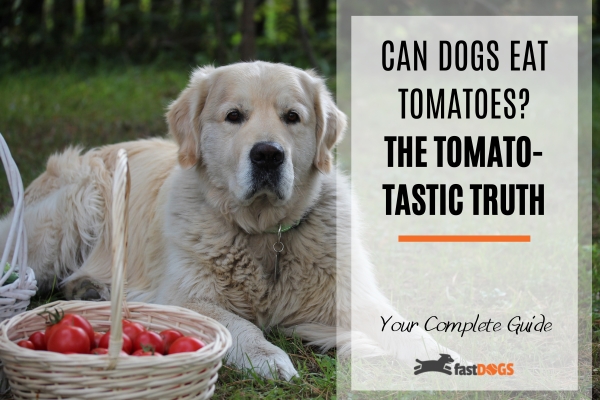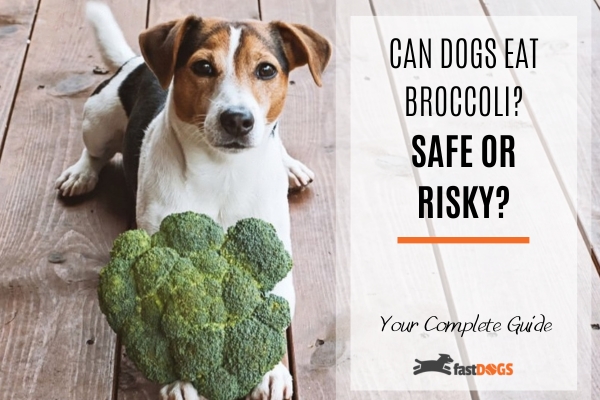Can Dogs Eat Peas? Pawsitively Green Cuisine!
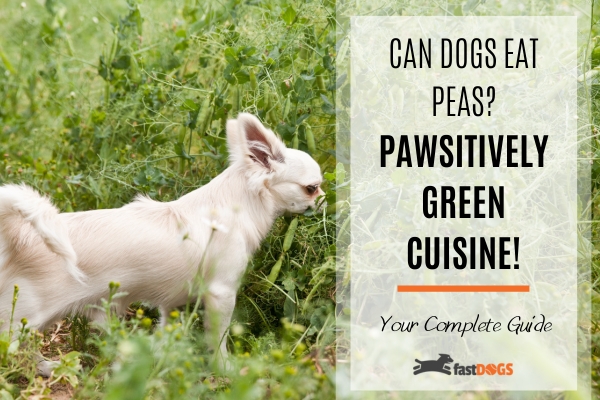
Can Dogs Eat Peas? No Thank You, or Yes Peas…
Whether they’re in a soup, a salad, or simply served on the side, peas are one of nature’s most nutritious superfoods – albeit in a tiny perfectly formed package!
But can dogs eat peas? Can our furry companions enjoy the benefits of this little legume? Or does something as small as a pea pose a risk to your canine’s health?Can Dogs Eat Peas? Contents
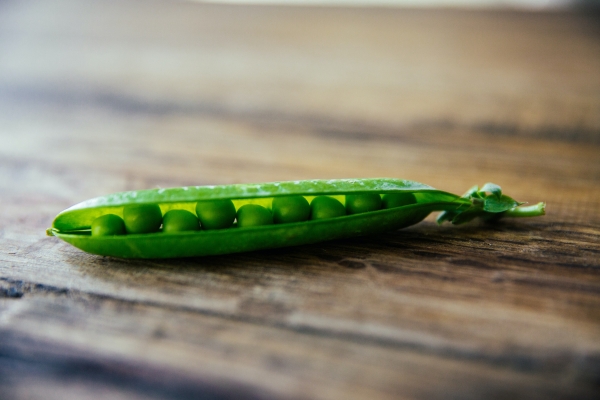
Can Dogs Eat Peas?
Certainly. Peas are safe for dogs to consume. They’re regarded as a nourishing and wholesome treat for your furry friend — delivering a wealth of nutritional advantages. In fact, if you examine the ingredients of numerous commercially available whole-food dog foods, you'll frequently find peas listed on the ingredients label.
Nonetheless, similar to everything beneficial for your canine companion, exercise caution not to overfeed them with peas, and strive to steer clear of any additional ingredients that might be included. Plus, if your dog has a kidney condition, you may wish to read our When Are Peas Bad for Dogs? section.Can Dogs Eat Frozen Peas?
Yes — in limited amounts, dogs are allowed frozen peas, provided they haven't been seasoned with salt or any other potentially harmful ingredients. You can even offer your dog some frozen peas directly from the freezer, although cooking them can enhance their chewability.
Can Dogs Eat Fresh Peas?
Yes. Fresh peas contain the most nutritional benefits for dogs. And, if you’re wondering, can dogs eat raw peas? Although they may be more difficult to digest, they too can be served in small quantities as a healthy treat.
When it comes to peas in a pod, the general rule is if you can eat the pea in a pod, your dog can too. Garden peas should always be shelled though, as the tough outer shells can often cause choking, especially in smaller dogs.
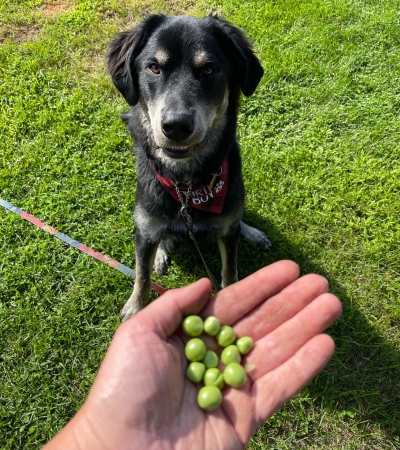
Can Dogs Eat Canned Peas?
No, they can’t. Canned peas contain higher levels of salt. Foods that contain excessive salt can present many potential health hazards for your pooch and can often cause dehydration in your pup.
This doesn’t just apply to green peas for dogs, but all canned varieties of peas, such as black-eyed or chickpeas, which may have other seasonings added as well as high levels of salt.
Can Dogs Eat Cooked Peas?
Yes, most definitely, and your pup will probably thank you for cooking them too. Boiling or steaming peas will make them much easier to digest for your pup and can even take away some of the bitter flavors often found in raw peas.
Be sure to cook the peas plain — don’t add any seasonings or ingredients like butter — some spices can be toxic for your dog, and too much fat is never a good thing for your pooch.
How Are Peas Good for Dogs?
Despite their small size, peas manage to pack in a whole range of nutrients. They serve as a valuable supply of vital vitamins (A, K, and Bs), while also containing essential minerals like iron, manganese, and phosphorus. These nutrients can contribute to a healthy immune system and your dog’s overall well-being.
Peas include a plentiful serving of protein and fiber that can support your dog's digestive system.
Adding to these benefits, peas also house antioxidants, particularly lutein, which research has indicated to be advantageous for a dog's skin, heart, and eyes.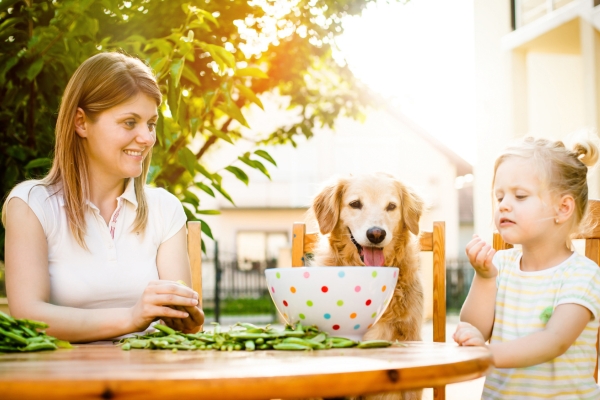
When Are Peas Bad for Dogs?
Unfortunately, it's not all good news. Peas contain purines, a naturally occurring chemical compound that can be harmful to dogs, especially those with kidney problems.
Purines undergo conversion into uric acid within the body, subsequently undergoing filtration through the kidneys.
In dogs with proper kidney function, the kidneys would efficiently filter the uric acid without encountering any issues. But if your pup’s kidneys aren’t working as they should, a build-up of high levels of uric acid can cause problems, such as kidney stones.How Much Peas Can My Dog Eat?
Food that’s naturally high in fiber, like peas, should only be served in small portions. This prevents stomach upset from introducing too much roughage to your dog’s digestive system.
What’s more, peas don’t form part of your pup’s regular doggy diet. Hence, they should be classed as a treat. The treat/food ratio is a 10/90 split — thus peas should constitute no more than 10% of their daily calorie intake.
Here’s what that would look like by dog size (per day):
Toy-sized/small dogs — give no more than a teaspoon.
Small to medium dogs — the amount of peas can be increased to 2 to 3 teaspoons.
Large dogs — can enjoy up to 2 tablespoons of nutritious peas.
Extra large/giant dogs (90+ pounds) — up to 3 tablespoons.
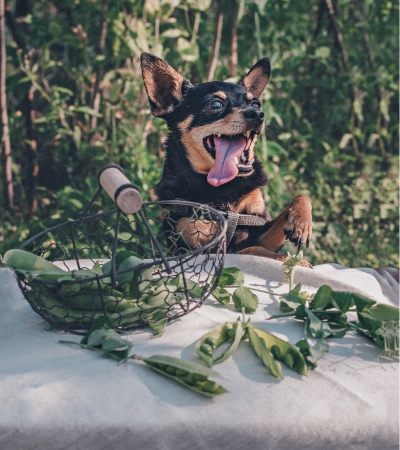
Final Thoughts
Dogs are traditionally carnivores and don’t need to eat fruit and vegetables like we humans do. In the wild, dogs would primarily eat meat-based proteins only and resort to greenery when meat was scarce. But if you’re looking for an occasional treat you can share with your pooch, vegetables can often be a great low-calorie option.
Can dogs eat peas? The first time you offer your pup peas, try them with a couple to see if they like the taste or texture. Just like our kids, some dogs will love them, yet others will spit them back out at you! But, if your pooch does like peas, they’re one of the most nutritious low-calorie treats you can give your pup. If only the kids were that easy!
Can Dogs Eat Peas? FAQs
Can Dogs Eat Green Peas?
Yes, most varieties of green peas are safe for dogs to eat — including garden peas and English peas, either fresh or frozen. However, avoid any processed peas in cans or jars, which often have higher salt levels due to the preservatives used.
Can Dogs Eat Chick Peas?
Chickpeas are a delicious source of protein and fiber, plus they have many nutritional benefits for your pooch too. But, avoid any preprocessed chickpeas as they often have added dog-unfriendly ingredients.
Ensure chickpeas are fully cooked before giving them to your canine companion. Your pup won’t thank you if you give them raw/dried chickpeas. And, don’t be tempted to give them hummus — most commercial brands include garlic, which can be highly toxic for dogs.
Can Dogs Eat Black Eyed Peas?
Yes. When served fresh and without any spices, etc., this legume isn’t harmful for your pooch.
Can Dogs Eat Snow Peas?
Snow peas and their close relative the sugar snap pea have a sweet flavor your pooch will love, and the good news is they’re both safe for your pooch to eat. Both are high in vitamins A and C, essential for your pup’s health.
However, the outer pods can be difficult for some dogs to digest. So, it’s best to remove the strings that run around the outside of the pod, or chop them into small pieces. Snow and sugar snap peas can be served fresh from the garden as long as they’re rinsed first. Cooking them will make them much softer to chew.
Can Puppies Eat Peas?
Yes, puppies can also eat peas. They can be good for their developing eye health, skin, and immune systems. However, be cautious when feeding to very young pups, less than 2 months, as their kidneys may not be functioning at full capacity yet and unable to filter out any excess uric acid from the purines.
What Fruits and Vegetables Can Dogs Eat?
Nature’s amazing health benefits aren’t just limited to peas. There are many other vegetables and fruits which your dog can safely consume and enjoy a nutritional boost to their health.
Vegetables include:
Brussel sprouts.
Carrots.
Celery.
Sweet potatoes/potatoes.
Sweetcorn.
And, dog-safe fruits include:
Apples.
Cranberries.
Nectarine.
Orange.
Peach.
Pears.
Pumpkin.
Strawberries.
Watermelon.
It's always important to note that what might be a small portion for us can be significant for our dogs, so it's advisable to keep treat sizes small.

